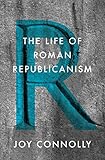The Life of Roman Republicanism / Joy Connolly.
Material type: TextPublisher: Princeton, NJ : Princeton University Press, [2014]Copyright date: ©2014Edition: Course BookDescription: 1 online resourceContent type:
TextPublisher: Princeton, NJ : Princeton University Press, [2014]Copyright date: ©2014Edition: Course BookDescription: 1 online resourceContent type: - 9780691162591
- 9781400852475
- 937.02 23
- DG231
- online - DeGruyter
- Issued also in print.
| Item type | Current library | Call number | URL | Status | Notes | Barcode | |
|---|---|---|---|---|---|---|---|
 eBook
eBook
|
Biblioteca "Angelicum" Pont. Univ. S.Tommaso d'Aquino Nuvola online | online - DeGruyter (Browse shelf(Opens below)) | Online access | Not for loan (Accesso limitato) | Accesso per gli utenti autorizzati / Access for authorized users | (dgr)9781400852475 |
Browsing Biblioteca "Angelicum" Pont. Univ. S.Tommaso d'Aquino shelves, Shelving location: Nuvola online Close shelf browser (Hides shelf browser)

|

|

|

|

|

|

|
||
| online - DeGruyter The Age of Garvey : How a Jamaican Activist Created a Mass Movement and Changed Global Black Politics / | online - DeGruyter The Making of the Ancient Greek Economy : Institutions, Markets, and Growth in the City-States / | online - DeGruyter Sexing the World : Grammatical Gender and Biological Sex in Ancient Rome / | online - DeGruyter The Life of Roman Republicanism / | online - DeGruyter Homeric Effects in Vergil's Narrative : Updated Edition / | online - DeGruyter The Birth of Hedonism : The Cyrenaic Philosophers and Pleasure as a Way of Life / | online - DeGruyter Genealogy of the Tragic : Greek Tragedy and German Philosophy / |
Frontmatter -- CONTENTS -- PREFACE -- ACKNOWLEDGMENTS -- INTRODUCTION -- 1. Where Politics Begins: Cicero's Republic -- 2. Justice in the World: The Execution of Jugurtha -- 3. Non-Sovereign Freedom in Horace's Satires 1 -- 4. DIVIDUAL ADVOCACY -- 5. Imagination, Finitude, Responsibility, Irony: Cicero's pro Marcello -- CONCLUSION. THE REPUBLIC REMASTERED -- BIBLIOGRAPHY -- INDEX
In recent years, Roman political thought has attracted increased attention as intellectual historians and political theorists have explored the influence of the Roman republic on major thinkers from the Renaissance to the Enlightenment. Held up as a "third way" between liberalism and communitarianism, neo-Roman republicanism promises useful, persuasive accounts of civic virtue, justice, civility, and the ties that bind citizens. But republican revivalists, embedded in modern liberal, democratic, and constitutional concerns, almost never engage closely with Roman texts. The Life of Roman Republicanism takes up that challenge.With an original combination of close reading and political theory, Joy Connolly argues that Cicero, Sallust, and Horace inspire fresh thinking about central concerns of contemporary political thought and action. These include the role of conflict in the political community, especially as it emerges from class differences; the necessity of recognition for an equal and just society; the corporeal and passionate aspects of civic experience; citizens' interdependence on one another for senses of selfhood; and the uses and dangers of self-sovereignty and fantasy. Putting classicists and political theorists in dialogue, the book also addresses a range of modern thinkers, including Kant, Hannah Arendt, Stanley Cavell, and Philip Pettit. Together, Connolly's readings construct a new civic ethos of advocacy, self-criticism, embodied awareness, imagination, and irony.
Issued also in print.
Mode of access: Internet via World Wide Web.
In English.
Description based on online resource; title from PDF title page (publisher's Web site, viewed 23. Mai 2019)


